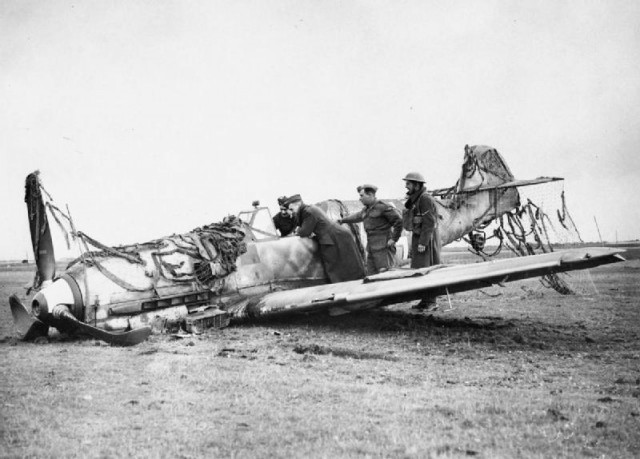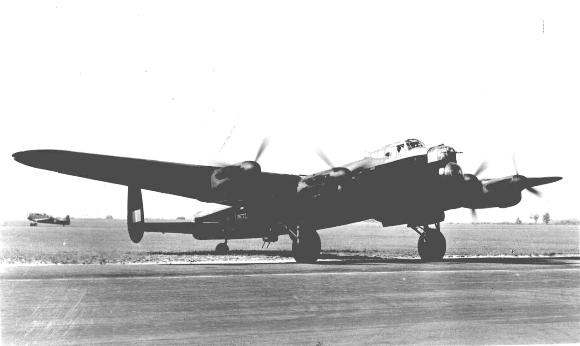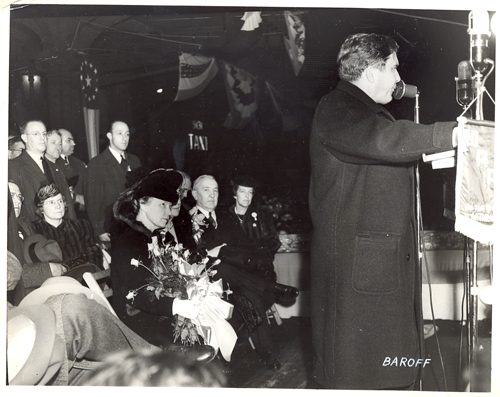Friday 25 October 1940
The Luftwaffe fighter squadrons all fly three (or more) missions during the day, as is usually the case on days of maximum effort. The ratio of Jabos to fighters is usually 2 bomb-less Bf 109s per Jabo (which also, of course, are often Bf 109s).
The raids begin around 09:00, when JG 26 and JG 51, the two premier formations on the Channel coast, head for the South London area. Other Luftwaffe formations head toward Hastings and Dungeness, still others toward Central London. RAF Biggin Hill takes a beating despite fierce defense. The RAF fighters take a beating over Madstone, losing three fighters to one Bf 109.
Another large effort takes place around noontime. Once again, it heads for Maidstone and RAF Biggin Hill/Hornchurch. This is a large raid of over 100 planes crossing at Dover. As it flies inland, the formation breaks up to attack different targets. No. 12 Group has three squadrons in the air on patrol which lie in wait around London. The Jabos drop their bombs more or less over their targets, and then both sides take losses.
Another large formation crosses at around 13:00. This time, RAF Fighter Command has planes ready to confront the attackers near the coast. The Luftwaffe formation splits up, some remaining to tangle with the RAF fighters and the others heading west for Westminster, Blackfriars Road and areas nearby. This raid causes casualties at the Air Provost Marshal's department at Westminster (four dead, 8 others wounded). Both sides take losses as the Jabos fight their way through to their targets.
The next large raid is around 15:00, and once again the main target is London and nearby areas. Fighter Command is late off the mark and makes few interceptions and the few RAF fighters that do take a beating. Two Hurricanes collide, killing one of the pilots.
Around dusk, RAF Montrose in Scotland suffers a rare raid from KG 26 Heinkel He 111s based in Norway. Five men are killed and 21 wounded in this raid, which is completely unexpected and causes a lot of damage. Perhaps as a result of poor bombing accuracy, nearby towns also suffer damage.
A 20-plane Luftwaffe formation attacks a convoy off North Foreland around 17:45. This results in one ship sunk.
After dark, the population centers of London, the Midlands, South Wales, Pembroke, Cardiff, and Liverpool are the primary targets. Airfields at Wittering and Middle Wallop also suffer damage. London is hit by about 150 bombers. The Luftwaffe continues its extensive recent mining operations (see below), dropping mines off Aberdeen, Liverpool, East Anglia and along the northeast coastline.
Overall, it is a day of moderate losses for both sides. The Luftwaffe loses roughly 15 planes while the RAF about 10. RAF No. 610 Squadron also loses two Hurricanes in a mid-air collision during training off Exmouth around 15:00 (this is in addition to the collision described above).
Maj. Werner Mölders of JG 51 downs a Spitfire off Dover for his 51st victory.
The British Air Ministry issues a statement noting that airmen from numerous countries are contributing to the defense of Great Britain, including the United States, Poland, France, Belgium, Holland, and Czechoslovakia. The US pilots are part of the Eagle Squadron of volunteers.
 |
| Shown is Messerschmitt Bf 109E-4 (W.Nr. 1988) ‘Black 7’ of 5./JG54. It crash-landed at Broom Hill, near Lydd, Kent at 09:30 on 25 October 1940. Pilot Oberleutnant Schypek was captured. |
Battle of the Atlantic: The U-boats that have been on patrol in the Atlantic, having gorged on Convoys SC 7 and HX 79 earlier in the week, make port in France to re-stock their torpedoes and other supplies. This period thus marks a lull in U-boat successes, but the Germans have other ways to keep the pressure on Allied shipping. These make their mark today in the form of mines and the Luftwaffe.
The Luftwaffe bombs and sinks the South Goodwin Lightship off St. Margaret's Bay, Kent.
The Luftwaffe bombs and sinks 89-ton Royal Navy trawler HMT Duthies at Montrose, Angus. Everybody aboard survives.
In the same attack at Montrose, the Luftwaffe damages 25-ton fishing boat Janet.
Royal Navy 338 ton trawler HMT Lord Inchcape hits a mine and sinks near Plymouth, Devon. The ship sinks in shallow water and is later salvaged.
British 45 ton trawler Encourage also hits a mine and sinks off Plymouth. All four men on board perish.
British coaster Buoyant hits a mine and blows up at the mouth of the Humber.
British 207 ton trawler Carlton also hits a mine at the mouth of the Humber and sinks. There are seven survivors and three men perish.
British 222 ton fishing boat Windsor also hits a mine in the Humber, just south of Spurn Point, Yorkshire. One crew member perishes.
British freighter Kyle Skye runs aground on the Isle of Arran, Bute. The ship is lost, but the crew survives.
British freighter Blairsprey, part of Convoy SC 7 and torpedoed on the 18th by U-101 and on the 19th by U-100, makes it under tow to the Clyde in Scotland, where it is beached. The ship will be repaired.
U-46 (Kptlt. Engelbert Endrass), still on patrol in the Atlantic after its numerous victories against the convoys earlier in the week, is attacked by three RAF Lockheed Hudson bombers. The submarine gets away, but one crew member (Matrosengefreiter (Able Seaman) Plaep) perishes from his wounds on the 26th.
Convoy OL 9 departs from Liverpool, Convoy Fn 319 departs from Southend, Convoy SLS 53 departs from Freetown, Convoy BN 8 departs from Bombay bound for Suez.
British gunboat HMS Aphis bombards Italian troop positions 15 miles east of Sidi Barrani. The RAF bombs Tobruk.
The war on Malta is causing serious morale problems that result from safety measures. One of these today is the closing of a cemetery, Addolorata Cemetery, which lies on a direct path between Grand Harbour and Luqa Airfield. The cemetery has become a hot spot for bombs, so public access is restricted. While this in normal times might seem a minor inconvenience, local citizens have paid an unusual amount of attention to gravesites of their ancestors since the start of the war - perhaps because they know they might soon be joining them. Also, a new bomb disposal course concludes, the first one for men on the island.
German/Italian Relations: Ribbentrop's rushed letter to Italian Foreign Minister Count Ciano, completed from start in France to hand delivery in Rome in about 18 hours, is greeted with joy by Ciano when ambassador Mackensen hands it to him around noontime. Ciano sees it as a tacit agreement by Germany that Italy is entitled to additional territory in southern France - which is not the intent behind the letter. Ciano off-handedly proposes a date of 3 or 4 November for the meeting between Mussolini and Hitler that Ribbentrop proposes in it. Ribbentrop calls immediately after German ambassador Mackensen has left and proposes an even earlier date. They agree on 28 October - only three days hence - for the meeting, to be held in Florence. Hitler redirects his train "Amerika" from its scheduled return to Berlin to go over the Alps for the meeting. It all fits perfectly into his schedule.
The timing of all this frantic activity has become a matter of historical debate. The 28th also just so happens to be the planned start date for Mussolini's invasion of Greece. The theory is that Hitler suddenly changes his plans and hurries down to Italy to try to stop the invasion of Greece. However, there is doubt whether the Italians have actually told the Germans the actual start date of the invasion, which Ciano previously has indicated would be 23 October but obviously has been postponed. The better view appears to be that Hitler was not planning to interfere with the Italian attack at all - he had not when informed of it previously - but instead decides to visit with Mussolini in Florence simply to smooth things over after the agitation caused by his visits to Spain and France. In other words, Hitler did not suddenly rocket down to Italy in a panic to try to stop the Italian offensive, but instead as a quick show of support to Mussolini and the alliance with Italy.
Hitler's quick schedule change also may fit into some broader themes. For security purposes, he likes to vary his itinerary on the fly. This, in fact, already has saved his life at least once (at the Braun Haus in Munich in late 1939). His visit to Paris in June also was unplanned. One never knows when the RAF or some lone wolf terrorist might want to try to bomb his train (and an awful lot of people know his general itinerary by this point).
Hitler also likes to take care of diplomatic visits all at once, in quick succession. An example of this is on D-Day, 6 June 1944, when he spends the day with such visits rather than reviewing the dire war situation. Since Hitler already is on his train, with all of his necessary staff close at hand, it makes sense to just do a quick jog over the mountains rather than disrupt his entire schedule to get his train ready at some future point. He also has the Molotov visit approaching, and it would be better to get his own house in order before making big decisions with the USSR. Finally, winter is approaching, and better to get this kind of travel over the Alps out of way now.
German Military: General Johannes Blaskowitz is appointed commander of the German 1st Army. He takes over from Generalfeldmarschall Erwin von Witzleben, who remains in good standing but is a silent opponent to the regime. Von Witzleben will receive future appointments of significance, but for now, it is on to the reserve rolls for him.
British Military: Air Marshal Charles Portal officially takes over as RAF Chief of Staff. He takes the temporary rank of air chief marshal. Issues confronting him include a desire by the Royal Navy to absorb RAF Coastal Command and the wishes of the British Army to form its own air force. Air Chief Marshal Richard Peirse remains in charge of Bomber Command, but there is some grumbling that bombing operations should be more aggressive.
The War Cabinet decides to continue the battleship construction program due to concerns about developments in the Far East.
Italian Military: Commando Supremo forms the Forza Navale Speciale (FNS). The first commander is Vice Admiral Vittorio Tur.
 |
| General Davis in August 1944. |
Light cruiser USS St. Louis leaves Hamilton, Bermuda for Norfolk, Virginia. It carries the Greenslade Board, which is inspecting bases acquired in the destroyers-for-bases deal with the UK.
Indochina: The Japanese 5th Infantry Division is withdrawing in northern Indochina, and the French re-occupy the territory around Lang Son. The French also launch operations against nationalists who have been taking over local governments in the area.
China: The Japanese (13th Kokutai) bomb Chungking again, which they have been doing regularly for months. This raid is different because the bombs fall close to US Navy gunboat Tutuila and the US embassy. The bombs fall within 300 yards of the US assets. The Japanese later blame the incident on faulty bomb-release mechanisms.
American Homefront: The US Presidential campaign is in the home stretch. Republican candidate Wendell Willkie campaigns today in Lackawanna Station.
Future History: Robert Montgomery Knight is born in Massillon, Ohio. Knight plays on the 1960 Ohio State NCAA Championship team (and also the team that played in the Championship game in 1961), then begins coaching JV basketball at Cuyahoga Falls High School. After joining the US Army, he becomes an assistant coach with the Army Black Knights team at West Point. One of his players is Mike Krzyzewski. In 1971, he joins Indiana State as head coach. He coaches some of the best college basketball teams of all time, including going the entire 1975-76 season without a single loss - the only time in history that has happened. Known as "Bobby Knight" for much of his career, he later indicates a preference for Bob Knight or, in most circumstances, Coach Knight. Bob Knight remains active to this day as both a coach and a broadcaster and dabbled in politics in 2016.
October 1940
October 2, 1940: Hitler's Polish Plans
October 3, 1940: British Cabinet Shakeup
October 4, 1940: Brenner Pass Meeting
October 5, 1940: Mussolini Alters Strategy
October 6, 1940: Iron Guard Marches
October 7, 1940: McCollum Memo
October 8, 1940: Germans in Romania
October 9, 1940: John Lennon Arrives
October 10, 1940: Führer-Sofortprogramm
October 11, 1940: E-Boats Attack!
October 12, 1940: Sealion Cancelled
October 13, 1940: New World Order
October 14, 1940: Balham Tragedy
October 15, 1940: Mussolini Targets Greece
October 16, 1940: Japanese Seek Oil
October 17, 1940: RAF Shakeup
October 18, 1940: Convoy SC-7 Catastrophe
October 19, 1940: Convoy HX-79 Catastrophe
October 20, 1940: Convoy OB-229 Disaster
October 21, 1940: This Evil Man Hitler
October 22, 1940: Aktion Wagner-Burckel
October 23, 1940: Hitler at Hendaye
October 24, 1940: Hitler and Petain
October 25, 1940: Petain Woos Churchill
October 26, 1940: Empress of Britain Attack
October 27, 1940: Greece Rejects Italian Demands
October 28, 1940: Oxi Day
October 29, 1940: US Draft Begins
October 30, 1940: RAF Area Bombing Authorized
October 31, 1940: End of Battle of Britain
2020





No comments:
Post a Comment